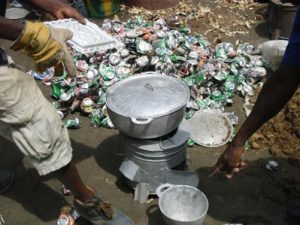The Waste Project continues to grow
Why would a friendship link like One World Link become involved in developing the waste disposal system for the City of Bo? The answer is that we have been able to bring together specialists from our own county with our friends in Bo City Council.
As you may have read in past articles, it all started with a study of the needs of the Council, then developed into a pilot project that has now become a full-blown internationally funded programme from our very own government.
The pilot showed that a skip type of collection service for this community was the right way to go. No real room to have large lorries moving between households, so now Bo’s rubbish is collected in skips. Each skip is strategically placed around the city to accommodate as much of the population as possible, (more skips will always be welcomed). Each location has a minimum of two skips to enable both garden and food waste to be separated from the general waste after all the dry recycles are removed. This is the principle of the operation, but in reality it does not work fully, thus still more behaviour change is need to Waste disposal – a national flagship project Glenn Fleet returns to Bo to find that the project has continued to develop despite the Ebola outbreak get users to separate the material (it will come in time).
At the front end of the operation a youth organisation, Klin Bo Services, are contracted to gather waste door-to-door for a small fee or, if the residents do not want to pay, they may take their own waste to the skips. The process of sorting the recycles forms part of the youth organisation’s contract and they can sell on the recycles.
The council then take the skips to official disposal site. This site is presently being developed to accommodate not just the disposal of the general waste, but also to process the green waste into compost. Some £300,000 will be spent on this part of the project, which includes the development of the road, new building, a machine to shred the green waste and a weighbridge. On top of this, two second-hand skip lorries have been purchased. These lorries are well built and should last for many years if looked after. Only a small proportion of the city is covered so far and there is much to do to expand the scheme and to make it sustainable in the long term but a major triumph is that it never stopped during the Ebola crisis and the Ebola outbreak is now over, fingers crossed.

Recycling and re-use are important aspects of the project. Fifteen small local enterprises are now involved in recycling waste and turning it into a profit. They came up with a variety of ideas and were finally chosen for project support in open competitions. Their ideas range from composting waste to making handbags, pots, slippers and bio-charcoal, and even making dolls’ houses out of paper waste. A potentially large industry could come from manufacturing pavestones out of waste plastic.
The four-year project is managed by Bo City Council with WHH of Germany, and is funded by £3.2 million of British aid, a long way to go. For more detail, including some excellent video, see the project Facebook page: Aluminium waste is turned into cooking pots.

